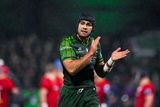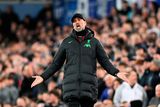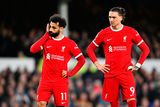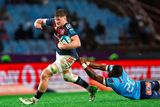Satellites keep shining stars from our gaze
IT should have been the shock of the new century. The right hook which bludgeoned the world heavyweight champion to the canvas in South Africa last April once would have forced the entire planet to take a standing count.
But not anymore.
Instead, the defeat of Lennox Lewis by little-known Hasim Rahman earned little more than a shrug from the general public.
After all, this was a champion who thought so little of his title, not to mention a $7m pay cheque, or Rahman, that he didn't bother to prepare properly for his outing. .
And even though Lewis was reunited with the WBC, IBF and IBO titles in a November rematch in Las Vegas, the stain of a second defeat to mediocre opposition was indelible.
No matter how the Briton performs in this year's megabuck showdown or two with Mike Tyson, Lewis is damaged goods, frail in the shadow of the many great champions.
Yet, the world has the heavyweight champion it deserves. Elite professional boxing has been taken from the people. Through the medium of pay-per-view television, it has become a plaything for the affluent, a Casino sideshow stripped of dignity, passion and vitality like some bloated Las Vegas Elvis.
There has been much in the past 12 months for those devoted to the sweet science to cling to. Given a chance to peek between the curtains, they might have seen Marco Antonio Barrera's beautiful banishment of the clown Prince, or Bernard Hopkins claiming the undisputed middleweight championship in a series reminiscent of the days of Hagler and Leonard.
No doubt, there's some great talent about. Sugar Shane Mosley would have shone in any generation, but the sport he graces is being throttled by many of those who are supposed to cherish it.
As tradesmen fight for world titles worth little more than an Argentinian peso, true genius is hidden from the masses. While the biggest ever pay-per-view event, Tyson v Holyfield II, was seen by fewer than two million people in the USA, more than fifty times that number used to tune into world heavyweight championship boxing on terrestrial TV in the '60s and '70s.
These days, most boxing in these islands is shown on satellite and cable and audiences are more often counted in tens rather than hundreds of thousands.
Okay, the UK pay-per-view record-holder, Lewis v Holyfield in March '99, drew an exceptional 400,000 subscriptions. Yet even that figure pales alongside the 10 million-plus viewers who watched the last world title fight on ITV in March 1995.
Men like Mosley and Hopkins should be world heroes but you'd be hard pressed to find anyone who could identify a picture of either in your local pub or on the average newspaper sports desk.
And what future can a sport have without super heroes?
Then, tragically, when terrestrial TV does climb back into the professional boxing arena, the BBC's producers have so little grasp of the business that they give Olympic gold medallist Audley Harrison's Bambi-like first steps as a professional the top-of-the-bill treatment.
Screening that level of competition prime-time on a Saturday evening did the sport a grave disservice. Viewers turned off in droves, with figures plummeting from five to one million in the course of three predictably woeful fights.
There's no shortage of first class fighters in Ireland and Britain capable of entertaining a mass audience. Locally, there is much excitement in prospect for 2002, especially as Commonwealth light-welterweight champion Eamonn Magee's path converges with that of his Frank Warren stablemate Ricky Hatton.
Manchester man Hatton's publicity caravan is building up momentum right now, but a grimly focussed Magee looms like a brick wall. One can expect a collision in the autumn.
Magee's super-middleweight namesake Brian Magee is also expected to cut a swathe through the British scene after his recent demolition of Argentinian hardman Ramon Britez, while it's good to see another Belfastman, Damaen Kelly, get a richly deserved chance to resume his flyweight career on the Harrison/BBC bandwagon.
Down south, huge interest will surround Jim Rock's grudge re-match against Englishman Ian Cooper, his surprise pre-Christmas conqueror in London. Rock will pack them in for that one, probably in his native Dublin before the end of February.
In the longer term, Rock's manager Brian Peters has sent 21-year-old Bernard Dunne to Los Angeles for grooming under Freddie Roach, a leading disciple of the legendary trainer, the late Eddie Futch. Judging by his knock-out professional debut in California before Christmas, Dunne has the potential for greatness.
On Saturday week, the Dublin featherweight will have a chance to impress the Las Vegas cognoscenti when he appears, along with Wayne McCullough, on that classy Acelino Freitas/Joel Casamayor World Super-featherweight title bill.
Now 30, McCullough's long-awaited return to the ring against Alvin Brown will be the first step in an ambitious bid to finish his career with a world championship flourish. And with promoter Mat Tinley of America Presents pursuing his interests with the vigour of old, one expects Wayne to deliver.
This is likely to yield a major bonus for the Irish boxing public. Despite overwhelming medical evidence in his favour, the British Board controversially still refuses Wayne a licence to box in his native city so McCullough's desire to fight in front of his home fans will bring him back to Dublin.
Hugely exciting times are also ahead on the Irish amateur scene as the IABA enters talks with the Sports Council confident that they will receive government funding of up to euro1m per year for the implementation of their recently-drafted strategic plan.
After the disappointment of Sydney, when just one Irish fighter qualified, last summer's world championships in Belfast served as a major boost to morale and not just because six of the home fighters made it into the quarter-finals, with one, team skipper James Moore, taking a bronze medal.
The event, a big hit in every sense, was described by the AIBA hierarchy as the best world championships in living memory. Yet, as they bask in the reflected glory, the Irish Association is also faced with the heavy responsibility of building on ground freshly broken.
Though scheduled to stage the four-nation Home International Championships in Killarney in April, they must make the most of the goodwill generated by Belfast to establish a top-rank annual tournament in this country in the hope that it might then be classified as an official Olympic qualifier.
Inside the ring, there is a duty to ensure that our elite fighters enjoy the same opportunities and facilities as their peers abroad. The new strategy proposes to deliver this through the introduction of a full-time professional administrative, coaching and training structure for the sport here.
The Sports Council is also expected to meet their obligations in this process as boxing clearly represents Ireland's best prospect of Olympic medals in Athens and should therefore serve as one of the central planks in the Council's new high-performance strategy.
Without doubt, Irish boxing is on the brink of an exciting and demanding new era yet, globally, one fears for the long-term future of a sport which, through naked greed, limits access to its superstars to a privileged few.














